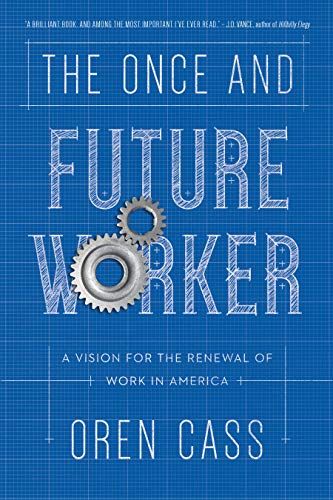Conservative Oren Cass argues the poor must pull themselves up and that US policy must bolster pride in simple, hard work.

Traditional Values
Conservative Oren Cass’s best-selling indictment of American labor and social policy since World War II attacks his fellow conservatives as much as it excoriates liberals. His central argument – that policy must help and encourage employed workers rather than idle ones – offers support for the displaced and unemployed. His advocacy for an end to unskilled immigration and a shift from welfare for the idle to assistance for the employed is controversial. Although he will provoke debate, Cass – the executive director of American Compass, a writer for the National Review and the domestic policy director of Mitt Romney’s 2012 presidential campaign – offers interesting opinions and ideas to all concerned with the future of US society.
Neglect and mismanagement of the labor market have been the central failures of American public policy for a generation.Oren Cass
William A. Galston, of the Brookings Institution, said that Cass’s “core principle ― a culture of respect for work of all kinds ― can help close the gap dividing the two Americas.” Yuval Levin, editor of National Affairs, wrote, “His diagnosis cuts to the heart of what’s troubling our political economy, and his prescriptions chart the way toward a more constructive politics.” Cass’s former boss, US Senator Mitt Romney felt his book “should be required reading for those who endeavor to create a labor market in which workers can create and support strong families and communities.” And Samuel Hammond of the Niskanen Center described it as, “a coherent critique of hyper-globalization paired with a strategy for re-empowering the working class.”
But Cass also drew opposing voices. Writing in Foreign Affairs, James K. Galbraith deems “Cass’s preoccupation with the labor market…one vast misunderstanding.” While acknowledging Cass’s respect for work and the worker, he criticizes the author’s opposition to regulations and his suggested “flex fund” for states, saying, “This is an old scam. Cass acts as if it will not occur to states to slash their benefits to chase their poor to other states.”
Good Jobs
Oren Cass believes purposeful work that pays enough to support a family is the bedrock of a functioning democracy, but he disregards the fact that access to such work for the unskilled or undereducated has eroded steadily in America since the 1970s.
Work may have large benefits, but it’s also often hard, and we need to maximize the reward for pursuing it.Oren Cass
Cass argues that, increasingly since the end of World War II, politicians have sacrificed jobs and productivity to encourage the flow of cheap goods in order to stimulate consumption. The resulting poverty rate, on the rise since the 1960s, means the United States spends more than $1 trillion annually in transfer payments to low-income individuals and families. He regards these policies as fomenting an epidemic of idle workers and soaring national debt.
Cass asserts that the United States must recalibrate its economic and labor policy. He feels state and local governments should support local jobs that pay living wages, and bring a halt to the immigration of unskilled workers. The federal government should renegotiate or cancel trade agreements that harm domestic manufacturing and low-skilled workers.
People derive more happiness from meaningful, productive work, according to Cass, than from their spouses or children. Where productive work exists, families and communities thrive, he contends. Having good jobs for all doesn’t mean that everyone gets rich, but, Cass clarifies, even menial work has value when it supports a family and improves a community.
Policies
Cass argues that new or restrictive environmental laws or regulations cost industry significantly in terms of compliance, which depresses wages, restricts investments and cuts jobs. Regarding workforce education and skills retraining, Cass says flatly that they fail because they only guess at what skills employers need. He recommends that government should work with businesses to provide federal funds to pay for specifically needed training.
Despite a four-decade effort to push every student through college, Cass maintains, fewer than half manage to obtain even a community college diploma. Some students might select, according to the author, a vocational track in 10th grade, so they can serve apprenticeships and earn wages before they graduate.
Cass suggests that employment taxes, laws and safety regulations burden employers with higher costs and leave workers with smaller paychecks.
Cheap goods and plentiful transfer payments ensured that nearly all Americans could afford…air conditioning, but not that they could build fulfilling lives around productive work, strong families and healthy communities.Cass Owen
When immigration rules tighten, Cass avows, the employment pool of low-skilled workers tightens, resulting in higher pay for working people. He believes policies should exclude immigrants without four-year college degrees, but should give current undocumented immigrants work permits of a duration that matches their time in the United States. Surprisingly, Cass favors a path to citizenship for anyone living in America for at least 10 years.
Cass believes state enticements and tax relief generate counterproductive interstate competition and results in unfairness to existing businesses. He’s repeatedly adamant that wage subsidies must support those who work, not those who don’t. Cass believes that government assistance to low-income households reduces the motivation to work; however, he does favor assistance for the old, disabled or temporarily unemployed.
Idleness
Cass contends that a crucial change must occur in culture and attitude. Work that supports a person’s family and community should bring social approval. Idleness, Cass claims, should bring shame. American culture must return to valuing independence, work and self-sufficiency, Cass states. He strenuously maintains that policymakers should abandon the idea of a universal basic income (UBI), because that would reduce people’s commitment to work, self-reliance, community and nation, while turning the United States into a nation of “trust-fund babies.”
Detached from Reality
Cass is a fervent conservative ideologue. Many of his arguments – such as opposing universal day care and universal basic income – hew to the conservative line. In exhorting the poor to get to work, Cass seems less concerned that the jobs the poor once embraced are increasingly scarce – they’ve moved overseas or automation has obviated them.
The once and future worker is not the same person, nor did workers of the past do the same jobs in the same ways.Cass Owen
While many of his arguments are thought-provoking and Cass writes well and persuasively, some of his proposals seem to hark back to a supposedly better but long since vanished era. And, in all fairness to Cass, a lot of water has gone under this bridge since his book came out in 2018. Works in a similar vein include Cristobal Young’s The Myth of Millionaire Tax Flight, Patrick J. Deenen’s Why Liberalism Failed and Ross Douthat’s The Decadent Society.








